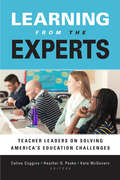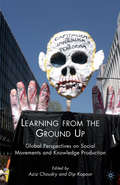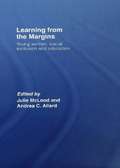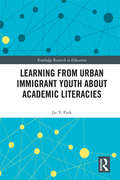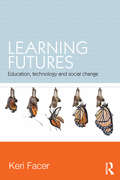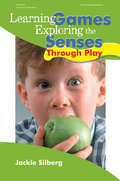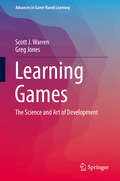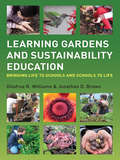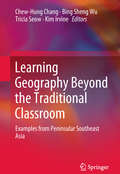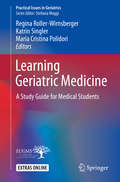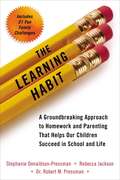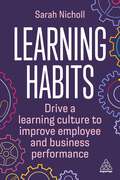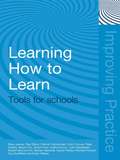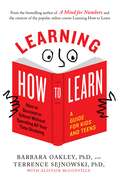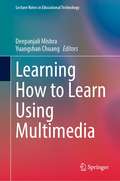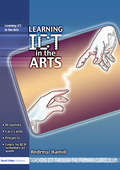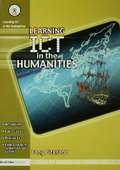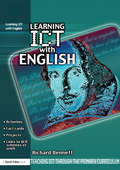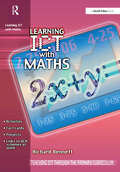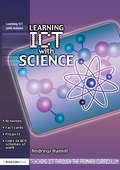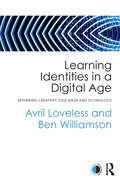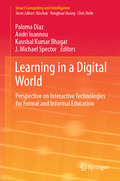- Table View
- List View
Learning from the Experts: Teacher Leaders on Solving America's Education Challenges
by Celine Coggins, Heather G. Peske, and Kate McGovernLearning from the Experts offers an intimate look at the ways education policies collide with everyday classroom practices and illustrates how thoughtful, solutions-oriented and results-driven teachers are reframing debates in education today. Early career teachers now make up a &“new majority&” (52 percent) of the workforce. Their ideas about the profession are often radically different from the previous generation&’s but are not often heard in education reform. Learning from the Experts draws on the work of the nonprofit organization Teach Plus to address this divide. In this lively collection, emerging teacher leaders in dialogue with seasoned leaders weigh in on the most difficult challenges in education today. Topics include the appropriate use of data, teacher effectiveness, retaining talented teachers in high-needs schools, reforming teacher unions, supporting teacher leadership, and strengthening the teaching profession itself.
Learning from the Experts: Teacher Leaders on Solving America's Education Challenges
by Heather G. Peske Kate Mcgovern Celine Coggins"Securing a world-class education for our students demands the contribution of a world-class teaching force. This volume contributes to this goal. Learning from the Experts captures the insights and ingenuity of our best and brightest teachers. The essays presented in these pages bolster my conviction that teachers can be architects of a stronger educational future."--Mitchell D. Chester, commissioner of elementary and secondary education, Massachusetts"Learning from the Experts should be required reading for policy makers, school officials, and would-be reformers who imagine that they can save public education. Our schools will be in good hands if teachers like these inspire more teachers like these to speak out and step up."--Susan Moore Johnson, Jerome T. Murphy Professor of Education, and director, The Project on the Next Generation of Teachers, Harvard Graduate School of Education"This book highlights the lessons we can learn from our very own teachers in the realm of best policy and practice. In doing so, it elevates the status of teaching as a profession. Learning from the Experts is a celebration of collaboration for the betterment of teachers and the students they serve."--John E. Deasy, superintendent, Los Angeles Unified School DistrictIn Learning from the Experts, emerging teacher leaders--in dialogue with seasoned leaders--offer an intimate look at the ways education policies collide with everyday classroom practices. This lively collection of essays illustrates how thoughtful, solutions-oriented and results-driven teachers are reframing debates in education today.
Learning from the Ground Up
by Aziz Choudry Dip KapoorThe dynamics, politics, and richness of knowledge production in social movements and social activist contexts are often overlooked. This book contends that some of the most radical critiques and understandings about dominant ideologies and power structures, and visions of social change, have emerged from those spaces.
Learning from the Margins: Young Women, Social Exclusion and Education
by Julie McLeod Andrea C. AllardThis collection of ground-breaking international essays address the educational, social, work and biographical experiences of young women who are routinely constructed as ‘at risk’ and on the margins. Drawing on research from an international range of scholars, this book brings together important new perspectives on the gendered dimensions of social exclusion and educational marginalisation. It offers practitioners as well as researchers insights into how to ‘research’ social marginalisation and reflections on projects and programmes that have attempted to do so. Chapters investigate key topics such as: early school leaving indigenous young women and schooling pregnant and parenting young women at school constructions of health, subjectivity and social class the politics of ethnicity. Provocative and insightful, this book will make interesting reading to students and post-graduate students of education, youth studies, gender studies, sociology and social work.
Learning from Urban Immigrant Youth About Academic Literacies (Routledge Research in Education #20)
by Jie Y. ParkThis book reports on a two-year long, qualitative literacy case study of the academic literacies of first and second-generation immigrant youth in an afterschool tutoring program in South Bronx, New York. Through transcripts of tutoring sessions, interview data, and youths’ written work, each chapter highlights how youth interpreted and navigated various school assignments, and what resources and perspectives they brought to unpacking the meaning and significance of texts and disciplinary discourses. By focusing on the immigrant youth themselves, and not on the teaching that happens (or does not happen) inside classrooms, this volume provides a unique and much-needed vantage point to understanding the academic literacies and engagement of urban immigrant youth.
Learning Futures: Education, Technology and Social Change
by Keri FacerIn the twenty-first century, educators around the world are being told that they need to transform education systems to adapt young people for the challenges of a global digital knowledge economy. Too rarely, however, do we ask whether this future vision is robust, achievable or even desirable, whether alternative futures might be in development, and what other possible futures might demand of education. Drawing on ten years of research into educational innovation and socio-technical change, working with educators, researchers, digital industries, students and policy-makers, this book questions taken-for-granted assumptions about the future of education. Arguing that we have been working with too narrow a vision of the future, Keri Facer makes a case for recognizing the challenges that the next two decades may bring, including: the emergence of new relationships between humans and technology the opportunities and challenges of aging populations the development of new forms of knowledge and democracy the challenges of climate warming and environmental disruption the potential for radical economic and social inequalities. This book describes the potential for these developments to impact critical aspects of education – including adult-child relationships, social justice, curriculum design, community relationships and learning ecologies. Packed with examples from around the world and utilising vital research undertaken by the author while Research Director at the UK’s Futurelab, the book helps to bring into focus the risks and opportunities for schools, students and societies over the coming two decades. It makes a powerful case for rethinking the relationship between education and social and technological change, and presents a set of key strategies for creating schools better able to meet the emerging needs of their students and communities. An important contribution to the debates surrounding educational futures, this book is compelling reading for all of those, including educators, researchers, policy-makers and students, who are asking the question 'how can education help us to build desirable futures for everyone in the context of social and technological change?'
Learning Games: Exploring the Senses Through Play
by Jackie SilbergHow do children learn about the world around them? They touch, taste, see, smell and hear it, of course! With over 200 activities, Learning Games will delight children as they expand their learning by engaging all of their senses. The chapters are organized by each of the five senses, with a bonus chapter of multi-sensory activities. The games and activities are designed to help children identify and use their senses-essential tools for understanding the world. Games Include: Partner Listening Paper Plate Shakers I've Got a Rhythm Dolphin Talk Listening to Paper The Binocular Game Color My World Glowing Mobile Walking Through Africa Magnify Your Life No Hands Fingerpaint with Textures Nose, Nose Smelly Walk Tongue Bumps Sweet or Sour Tasting in Space Let's Taste Red Taste Picture Book Body Part Senses Senses for the Hand
Learning Games
by Scott J. Warren Greg JonesThis book provides an overview of the design and development of learning games using examples from those created by the authors over last decade. It provides lessons learned about processes, successful approaches, and pitfalls that befall developers of learning games and educational transmedia experiences. The book includes stories from the authors' lives that give context to why and how they built these products to help the reader understand whether or not building a learning game is right for them and what challenges they might face. It also gives a framework for thinking ethically about design and research when it comes to designing complex digital systems like educational games.
Learning Gardens and Sustainability Education: Bringing Life to Schools and Schools to Life
by Jonathan Brown Dilafruz WilliamsOffering a fresh approach to bringing life to schools and schools to life, this book goes beyond touting the benefits of learning gardens to survey them as a whole-systems design solution with potential to address myriad interrelated social, ecological, and educational issues. The theoretical and conceptual framework presented creatively places soil at the center of the discourse on sustainability education and learning garden design and pedagogy. Seven elements and attributes of living soil and learning gardens are presented as a guide for sustainability education: cultivating a sense of place; fostering curiosity and wonder; discovering rhythm and scale; valuing biocultural diversity; embracing practical experience ; nurturing interconnectedness. The living soil of learning gardens forms the basis of a new metaphoric language serving to contest dominant mechanistic metaphors presently influencing educational discourse. Student voices and examples from urban schools provide practical understanding of how bringing life to schools can indeed bring schools to life.
Learning Geography Beyond the Traditional Classroom: Examples From Peninsular Southeast Asia
by Kim Irvine Tricia Seow Bing Sheng Wu Chew-Hung ChangThis book provides a collection of critical pieces that support the idea that good teaching and learning of geography in fieldwork and using technology should consider the dimensions of curriculum design, instructional design and resource provision, as well as assessment for such learning activities. Further, it clearly describes the thinking, experiences and critical comments concerning two broad areas of learning outside the traditional classroom – in the field and with technology.
Learning Geriatric Medicine: A Study Guide For Medical Students (Practical Issues in Geriatrics)
by Regina Roller-Wirnsberger Katrin Singler Maria Cristina PolidoriThis textbook presents hands-on training material for medical students. The style reflects the need for practice-based teaching with a modern edge in daily clinical routine; accordingly, it also employs online material and pocket cards. Each chapter begins with specific learning objectives, which are cross-referenced with the European curriculum for undergraduate medical education released by the European Union of Medical Specialists (UEMS) together with the European Union Geriatric Medicine Society (EUGMS), as well as the minimum geriatric competences for medical students established by the American Geriatrics Society (AGS). World-renowned European experts in practicing and teaching the interdisciplinary field of Geriatrics contributed to this work, with the aim of offering the new generation of health professionals a global perspective on one of the greatest public health challenges of our time: the management of the steadily increasing number of older, multimorbid, and vulnerable persons. The major strength of this book – published under the auspices of the EUGMS – is its pragmatic, goal-oriented approach, which makes it suitable for bedside learning and patient-centered medicine; further, all of the chapters are firmly based on the pillars of the ageing process in all of its biological aspects, helping readers understand the pathophysiology of and rationale behind interventions for the main geriatric syndromes and disorders.
The Learning Habit: A Groundbreaking Approach to Homework and Parenting that Helps Our Children Succeed in School and Life
by Rebecca Jackson Dr Robert Pressman Stephanie Donaldson-PressmanA groundbreaking approach to building learning habits for life, based on a major new study revealing what works - and what doesn't Life is different for kids today. Between standardized testing, the Common Core Curriculum, copious homework assignments, and seemingly endless amounts of "screen time," it's hard for kids - and parents - to know what's most essential. How can parents help their kids succeed - not just do well "on the test" -- but develop the learning habits they'll need to thrive throughout their lives?This important and parent-friendly book presents new solutions based on the largest study of family routines ever conducted. The Learning Habit offers a blueprint for navigating the maze of homework, media use, and the everyday stress that families with school-age children face; turning those "stress times" into opportunities to develop the eight critical skills kids will need to succeed in college and in the highly competitive job market of tomorrow - skills including concentration and focus, time management, decision-making, goal-setting, and self-reliance. Along with hands-on advice and compelling real-life case studies, the book includes 21 fun family challenges for parents and kids, bringing together the latest research with simple everyday solutions to help kids thrive, academically and beyond.
Learning Habits: Drive a Learning Culture to Improve Employee and Business Performance
by Sarah NichollA learning culture is essential to outperform the competition but how can Learning and Development (L&D) professionals achieve this? What habits do they need to develop in their workforce? Learning Habits is written by an author with over 20 years' experience using learning science to improve both business and employee outcomes. It explains what habits are necessary for an effective learning culture and how to develop them at individual, team and organizational levels. This book outlines each habit, explains what it is, why it makes a difference and how to measure it as well as providing a framework that can be used to make these habits become routine to ensure the learning sticks. Each habit is underpinned by behavioural science research and supported by practical advice, real world examples and case studies from global organizations. Learning Habits also includes checklists to track progress, a 'cue, routine, reward, reflect' model to make learning habits core to how the business operates and templates for measurement. This book is essential reading for all L&D practitioners who know that building a learning culture is crucial for individual and business success but don't know where to start.
Learning how to learn
by D. Bob Gowin Joseph D. NovakFor almost a century, educational theory and practice have been influenced by the view of behavioural psychologists that learning is synonymous with behaviour change. In this book, the authors argue for the practical importance of an alternate view, that learning is synonymous with a change in the meaning of experience. They develop their theory of the conceptual nature of knowledge and describe classroom-tested strategies for helping students to construct new and more powerful meanings and to integrate thinking, feeling, and acting. In their research, they have found consistently that standard educational practices that do not lead learners to grasp the meaning of tasks usually fail to give them confidence in their abilities. It is necessary to understand why and how new information is related to what one already knows. All those concerned with the improvement of education will find something of interest in Learning How to Learn.
Learning How to Learn: Tools for Schools (Improving Practice (TLRP))
by Mary James Paul Black Patrick Carmichael Colin Conner Peter Dudley Alison Fox David Frost Leslie Honour John MacBeath Robert McCormick Bethan Marshall David Pedder Richard Procter Sue Swaffield Dylan WiliamLearning how to learn is an essential preparation for lifelong learning. This book offers a set of in-service resources to help teachers develop new classroom practices informed by sound research. It builds on previous work associated with ‘formative assessment’ or ‘assessment for learning’. However, it adds an important new dimension by taking account of the conditions within schools that are conducive to the promotion, in classrooms, of learning how to learn as an extension of assessment for learning. Among the materials included you will find: an introductory in-service session self-evaluation questionnaires an action planning activity workshops tools for school development a network mapping activity guidance about different ways of using the resources teachers descriptions of ways they have used of adapted them references to further information and advice. In addition, there is a support website and examples of how individual schools have used or adapted these materials to maximize their benefits.
Learning How to Learn: How to Succeed in School Without Spending All Your Time Studying; A Guide for Kids and Teens
by Barbara Oakley Terrence Sejnowski Alistair McConvilleA surprisingly simple way for students to master any subject--based on one of the world's most popular online courses and the bestselling book A Mind for NumbersA Mind for Numbers and its wildly popular online companion course "Learning How to Learn" have empowered more than two million learners of all ages from around the world to master subjects that they once struggled with. Fans often wish they'd discovered these learning strategies earlier and ask how they can help their kids master these skills as well. Now in this new book for kids and teens, the authors reveal how to make the most of time spent studying. We all have the tools to learn what might not seem to come naturally to us at first--the secret is to understand how the brain works so we can unlock its power. This book explains: * Why sometimes letting your mind wander is an important part of the learning process * How to avoid "rut think" in order to think outside the box * Why having a poor memory can be a good thing * The value of metaphors in developing understanding * A simple, yet powerful, way to stop procrastinatingFilled with illustrations, application questions, and exercises, this book makes learning easy and fun.
Learning How to Learn Using Multimedia (Lecture Notes in Educational Technology)
by Deepanjali Mishra Yuangshan ChuangThis book introduces the concept of multimedia in education, and how multimedia technology could be implemented to impart digital education to university students. The book emphasizes the versatile use of technology enabled education through the research papers from distinguished academicians and researchers who are specifically working in this area. It benefits all those researchers who are enthusiastic about learning online and also for those academicians who are interested to work on various aspects of learning and teaching through technology.
Learning ICT in the Arts (Teaching ICT through the Primary Curriculum)
by Andrew HamillProviding practical guidance on enhancing learning through ICT in the arts, this book is made up of a series of projects that supplement, augment and extend the QCA ICT scheme and provide much-needed links with Units in other subjects’ schemes of work. It includes: examples and advice on enhancing learning through ICT in art, music, drama and design technology fact cards that support each project and clearly outline its benefits in relation to teaching and learning examples of how activities work in 'real' classrooms links to research, inspection evidence and background reading to support each project adaptable planning examples and practical ideas provided on an accompanying CD ROM. This book is invaluable reading for all trainee and practising primary teachers.
Learning ICT in the Humanities (Teaching ICT through the Primary Curriculum)
by Tony PickfordProviding practical guidance on enhancing learning through ICT in the humanities, this book is made up of a series of projects that supplement, augment and extend the QCA ICT scheme and provide much-needed links with Units in other subjects’ schemes of work. It includes: examples and advice on enhancing learning through ICT in history, geography and RE fact cards that support each project and clearly outline its benefits in relation to teaching and learning examples of how activities work in 'real' classrooms links to research, inspection evidence and background reading to support each project adaptable planning examples and practical ideas provided on an accompanying CD ROM. Suitable for all trainee and practising primary teachers.
Learning ICT with English (Teaching ICT through the Primary Curriculum)
by Richard BennettProviding practical guidance on enhancing learning through ICT in English, this book is made up of a series of projects that supplement, augment and extend the QCA ICT scheme and provide much-needed links with Units in other subjects’ schemes of work. It includes: fact cards that support each project and clearly outline its benefits in relation to teaching and learning examples of how activities work in 'real' classrooms links to research, inspection evidence and background reading to support each project adaptable planning examples and practical ideas provided on an accompanying CD ROM. This book is highly recommended for all trainee and practising primary teachers.
Learning ICT with Maths (Teaching ICT through the Primary Curriculum)
by Richard BennettProviding practical guidance on enhancing learning through ICT in maths, this book is made up of a series of projects that supplement, augment and extend the QCA ICT scheme and provide much-needed links with Units in other subjects’ schemes of work. It includes: fact cards that support each project and clearly outline its benefits in relation to teaching and learning examples of how activities work in 'real' classrooms links to research, inspection evidence and background reading to support each project adaptable planning examples and practical ideas provided on an accompanying CD ROM. Suitable for all trainee and practising primary teachers.
Learning ICT with Science (Teaching ICT through the Primary Curriculum)
by Andrew HamillProviding practical guidance on enhancing learning through ICT in science, this book is made up of a series of projects that supplement, augment and extend the QCA ICT scheme and provide much-needed links with Units in other subjects’ schemes of work. It includes: fact cards that support each project and clearly outline its benefits in relation to teaching and learning examples of how activities work in 'real' classrooms links to research, inspection evidence and background reading to support each project adaptable planning examples and practical ideas provided on an accompanying CD ROM. This book is essential reading for all trainee and practising primary teachers.
Learning Identities, Education, and Community
by Erstad, Ola and Gilje, Øystein and Sefton-Green, Julian and Arnseth, Hans Christian Ola Erstad Øystein Gilje Julian Sefton-Green Hans Christian Arnseth"This book offers a case study of children and young people in Groruddalen, Norway, as they live, study and work within the contexts of their families, educational institutions and informal activities. Examining learning as a life-wide concept, the study reveals how 'learning identities' are forged through complex interplays between young people and their communities, and how these identities translate and transfer across different locations and learning contexts. The authors also explore how diverse immigrant populations integrate and conceptualize their education as a key route to personal meaning and future productivity. In highlighting the relationships between education, literacy and identity within a sociocultural context, this book is at the cutting edge of discussions about what matters as children learn"--
Learning Identities in a Digital Age: Rethinking creativity, education and technology (Changing Times In Education Ser.)
by Avril Loveless Ben WilliamsonDigital media are increasingly interwoven into how we understand society and ourselves today. From lines of code to evolving forms of online conduct, they have become an ever-present layer of our age. The rethinking of education has now become the subject of intense global policy debates and academic research, paralleled by the invention and promot
Learning in a Digital World: Perspective on Interactive Technologies for Formal and Informal Education (Smart Computing and Intelligence)
by Paloma Díaz Andri Ioannou Kaushal Kumar Bhagat J. Michael SpectorThis book aims at guiding the educators from a variety of available technologies to support learning and teaching by discussing the learning benefits and the challenges that interactive technology imposes. This guidance is based on practical experiences gathered through developing and integrating them into varied educational settings. It compiles experiences gained with various interactive technologies, offering a comprehensive perspective on the use and potential value of interactive technologies to support learning and teaching. Taken together, the chapters provide a broader view that does not focus exclusively on the uses of technology in educational settings, but also on the impact and ability of technology to improve the learning and teaching processes.The book addresses the needs of researchers, educators and other stakeholders in the area of education interested in learning how interactive technologies can be used to overcome key educational challenges.
